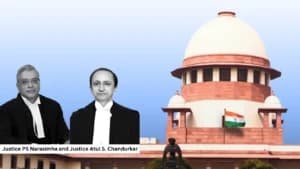The Punjab and Haryana High Court has emphasized that issuing non-bailable warrants should not be done in a routine manner and must be backed by strong reasons. Justice Sumeet Goel, while setting aside a bail cancellation order, ruled that courts must exercise judicial discretion and follow due process, especially in cases where the accused is not at fault.
The case involved a petitioner accused under Section 138 of the Negotiable Instruments Act. He had been granted bail earlier and was regularly attending court hearings. However, due to ill health caused by a medical condition—abnormal mild diffuse encephalopathy—he failed to appear in court on one occasion. This unintentional absence led to the cancellation of his bail and the issuance of non-bailable warrants.
The petitioner’s counsel, Mr. Vimal Kumar Gupta, pointed out that the petitioner couldn’t even inform his lawyer due to his health. He argued that this one-time absence was neither deliberate nor aimed at avoiding the proceedings. He further assured that the petitioner is fully committed to attending all future hearings and cooperating with the trial.
Justice Sumeet Goel noted:
“The issuance of non-bailable warrants must not be exercised in a mechanical manner. It must be adopted sparingly and only upon recording cogent reasons that reflect the necessity of such a stringent course.”
The Court observed that the trial court had acted harshly and failed to serve any prior notice before issuing the warrant. This, the High Court held, was contrary to established legal principles and procedural safeguards.
Referring to key Supreme Court rulings, the High Court quoted Gudikanti Narasimhulu v. Public Prosecutor and Sanjay Chandra v. CBI, highlighting that:
“Liberty is a matter of grave concern and its deprivation is justified only when absolutely necessary. Bail is not punitive—it’s a mechanism to ensure presence at trial.”
Read also: SC Confirms IMNS Officers Entitled to Ex-Servicemen Benefits Under Punjab Rules
Also citing Gurcharan Singh v. State (UT of Delhi), the Court stressed that each bail decision must consider the specific circumstances of the case and the accused’s behavior.
Considering that the petitioner voluntarily came forward, expressed willingness to face trial, and no evidence was presented indicating he would tamper with proceedings, the Court allowed the plea.
- The bail cancellation order dated 11.10.2024 was set aside.
- The petitioner must appear before the trial court on 09.06.2025 and on every subsequent date.
- He must deposit ₹10,000 with the Punjab and Haryana High Court Employees Welfare Association. Failure to do so will result in the dismissal of the petition.
- The petitioner must surrender his passport, if any, and comply with additional conditions set by the trial court.
The High Court's ruling underlines the importance of protecting procedural rights and ensuring that courts do not take coercive measures without justified grounds.
Title: Jaskaran Singh v. State of Haryana and another















